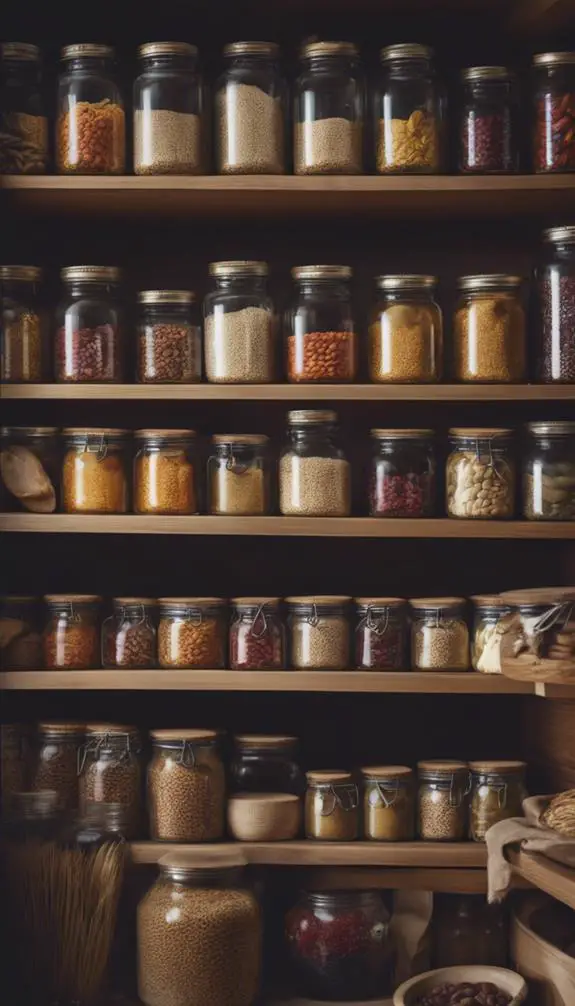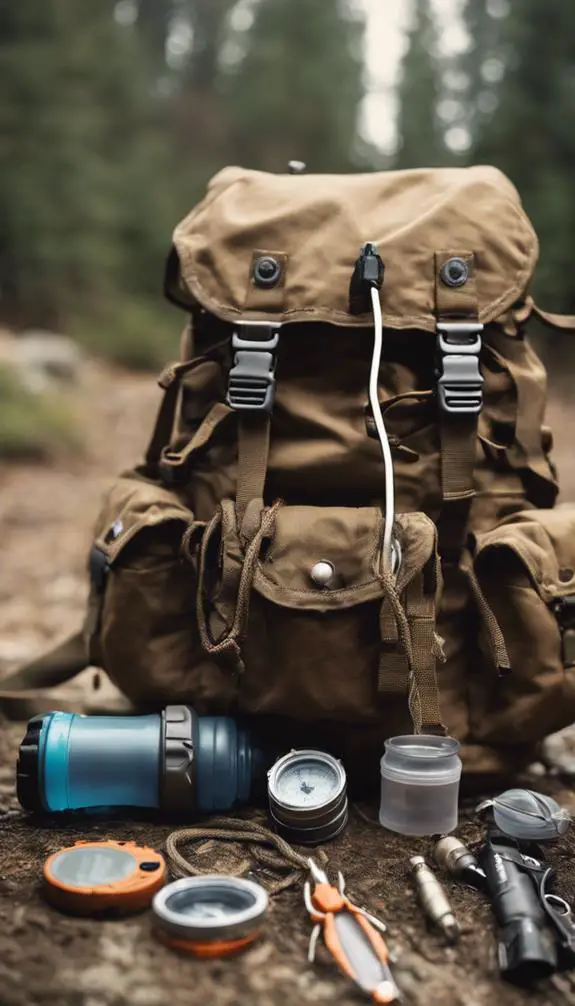As you begin to build your prepper pantry, you're probably wondering what essentials to stock up on. You're not alone – many people struggle to create a thorough list that covers all the bases. A well-stocked pantry should include more than just non-perishable food items; it should also consider personal care items, pet supplies, and beverages that promote hydration and comfort. But where do you start? What are the must-haves, and what can you skip? Let's break it down to guarantee you're prepared for any situation that comes your way.
Summary
- Stockpile non-perishable, high-calorie, and nutrient-dense foods like canned goods, dried fruits, and nuts for emergency situations.
- Include protein sources like freeze-dried meats, canned fish, and dried legumes to provide essential amino acids and energy.
- Store baking essentials like flour, sugar, and spices to maintain a sense of normalcy and provide comfort during uncertain times.
- Ensure a steady supply of beverages like water, coffee, and tea, along with a water purification system or tablets for safe hydration.
- Don't forget personal care pantry items like toilet paper, hand sanitizer, and feminine care products to maintain hygiene and health.
Canned Goods for Emergency
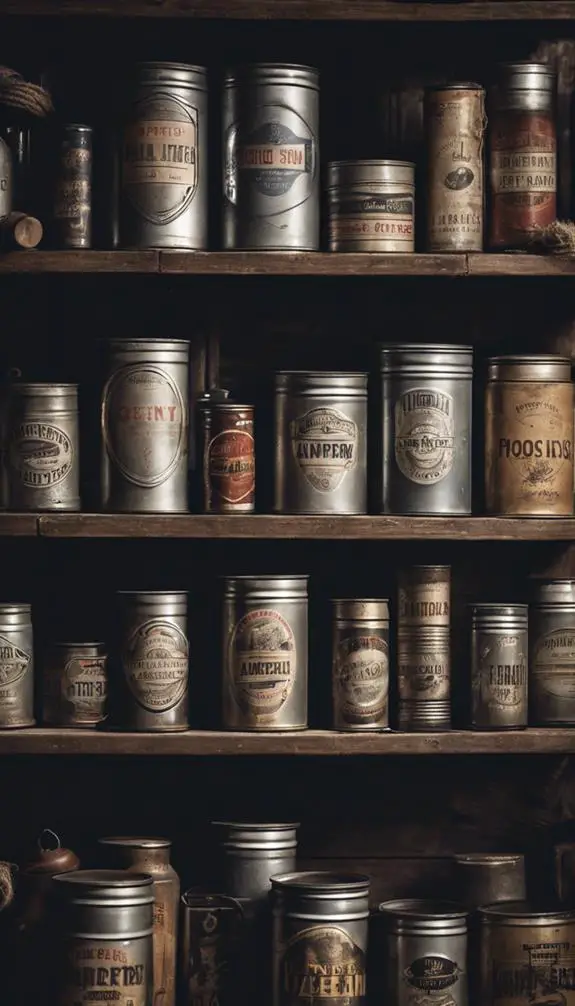
How long will your emergency food supply last if it doesn't include canned goods? Without them, you'll be left with a limited and potentially hazardous food stash.
Canned goods are a prepper's best friend, providing a shelf-stable and nutritious option for emergency situations. When selecting canned goods, prioritize those with a long Canned Expiration date to guarantee Food Safety.
Opt for low-sodium options and a variety of vegetables, fruits, meats, and soups to maintain a balanced diet. Don't forget to include a manual can opener in your supply kit, as electric can openers may be rendered useless in a power outage.
Dried Fruits and Nuts Essentials

You'll want to stock up on a variety of dried fruits, including apricots, apples, and mangoes, to provide a natural source of sweetness and essential vitamins.
Opt for nutrient-dense options like dates, prunes, and raisins, which are rich in fiber, potassium, and antioxidants.
Dried Fruit Varieties
Stocking up on dried fruit varieties is a great way to add natural sweetness, chewy texture, and essential nutrients to your prepper pantry.
You can choose from a range of options, including fruit leathers made from 100% fruit puree, which are perfect for snacking on the go.
Exotic apricots, with their sweet and tangy flavor, are another great addition to your pantry.
Other options include dried cranberries, raisins, and dates, which can be used in recipes or eaten as a healthy snack.
When selecting dried fruits, look for products that are low in added sugars and preservatives, and opt for unsweetened or low-sugar options whenever possible.
Nutrient Dense Options
A well-curated prepper pantry should prioritize nutrient-dense options, and dried fruits and nuts are some of the most essential items to include.
You'll want to stock up on vitamin-rich dried fruits like apricots, prunes, and raisins, which are packed with fiber, potassium, and antioxidants.
Mineral-dense nuts like almonds, cashews, and hazelnuts provide healthy fats, protein, and crunch.
Look for unsalted and unsweetened options to avoid added preservatives.
Dried fruits and nuts are perfect for snacking, adding to oatmeal or yogurt, or using in recipes.
They're also compact, lightweight, and easy to store, making them an ideal addition to your prepper pantry.
Long Shelf Life
Five to ten pounds of dried fruits and nuts can last for months when stored properly, making them a staple in your prepper pantry.
You'll want to stock up on a variety of options like apricots, apples, and mangoes, as well as nuts like almonds, walnuts, and pecans.
These items are essential for food storage due to their long shelf life and nutritional value.
When stored in a cool, dry place, they'll maintain their shelf stability for an extended period.
Be sure to package them in airtight containers to preserve their freshness.
In a survival situation, having a stockpile of dried fruits and nuts will provide you with a reliable source of energy and sustenance.
Grains for Food Security
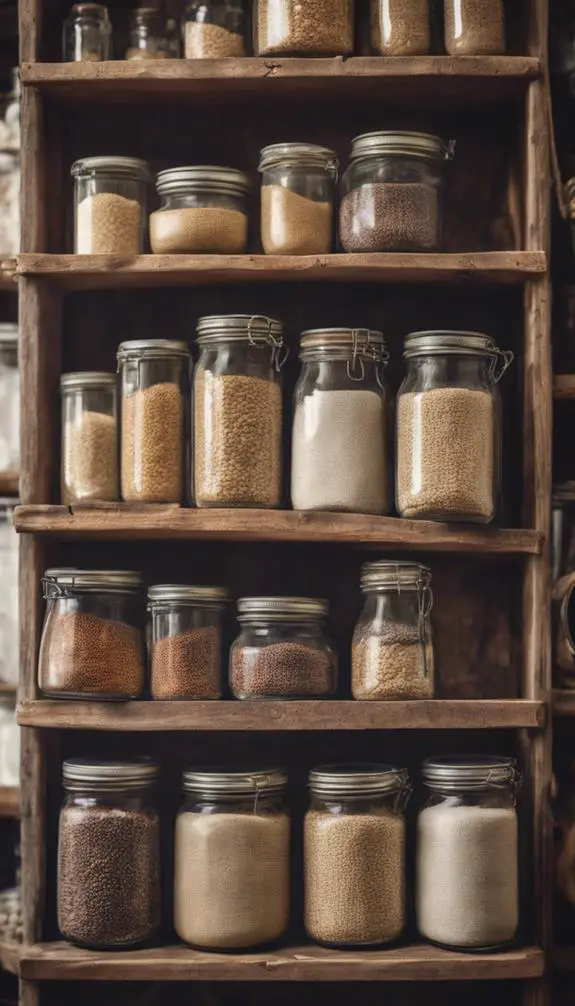
You'll want to stockpile a variety of grains to guarantee food security in case of an emergency.
Wheat and flour are must-haves, but you should also consider storing rice, oats, and barley to add diversity to your pantry.
Wheat and Flour Storage
Food security begins with a well-stocked pantry, and wheat and flour storage is a crucial component of that foundation.
You'll want to store wheat berries, which can be milled into flour as needed, to guarantee a steady supply of fresh flour.
When storing flour, keep it in airtight containers in a cool, dry place to prevent flour spoilage.
You can also store wheat berries in food-grade buckets or Mylar bags with oxygen absorbers to maintain freshness.
Consider investing in a wheat mill or grain grinder to grind your wheat berries into flour as needed.
This will guarantee you have a steady supply of fresh flour for baking and cooking.
Rice and Grain Options
Having a reliable source of grains is essential to your food security plan.
When it comes to rice, consider stocking up on a variety of types, including white, brown, jasmine, and basmati. Each has its own unique flavor and nutritional profile, ensuring you'll have options for different meals.
For grain storage, look for airtight, moisture-proof containers that can be stored in a cool, dry place. You can also use Mylar bags or vacuum-sealed containers to keep grains fresh for longer.
Store them off the floor and away from direct sunlight to maintain quality. With a well-stocked grain supply, you'll be prepared to whip up a variety of meals, from hearty breakfasts to satisfying dinners, no matter what the future holds.
Oat and Barley Uses
When it comes to oat and barley uses, versatility is key to getting the most out of these grains for food security.
You can enjoy oatmeal as a hot breakfast cereal, or use rolled oats to bake delicious oatmeal cookies. Oats can also be sprouted or made into flour for bread and other baked goods.
Barley, on the other hand, is perfect for hearty Barley soups, stews, and risottos. You can also use barley flour to make bread, or as a thickening agent in soups and sauces.
Both oats and barley can be stored for long periods, making them ideal for your prepper pantry. With a little creativity, these grains can provide a nutritious and filling base for many meals.
Protein Sources for Survival

About 30 days' worth of protein-rich staples can mean the difference between life and death in a survival situation.
You'll want to stock up on protein sources that are compact, lightweight, and won't spoil easily. Freeze-dried meats like beef, chicken, and turkey are great options. They're lightweight, nutritious, and can be stored for up to 25 years.
If you're an experienced hunter, consider preserving wild game through smoking, salting, or dehydrating. This will provide you with a sustainable source of protein and help you maintain your independence.
When selecting protein sources, prioritize those that are high in protein, low in sodium, and rich in essential nutrients. By doing so, you'll be well-prepared to face any survival situation that comes your way.
Canned Meat and Fish Options

A dozen cans of meat and fish can provide a substantial boost to your protein stores, offering a shelf-stable alternative to freeze-dried options.
When selecting canned fish, consider tuna varieties like albacore, skipjack, and yellowfin, which are rich in protein and omega-3 fatty acids.
Salmon benefits include high levels of vitamin D and selenium, making it an excellent addition to your pantry.
Look for canned salmon in water or olive oil to avoid added salt.
Other options include canned chicken, beef, and pork, which can be used in a variety of recipes.
Be sure to choose low-sodium options and store them in a cool, dry place to maintain their shelf life.
Dried Legumes for Nutrition
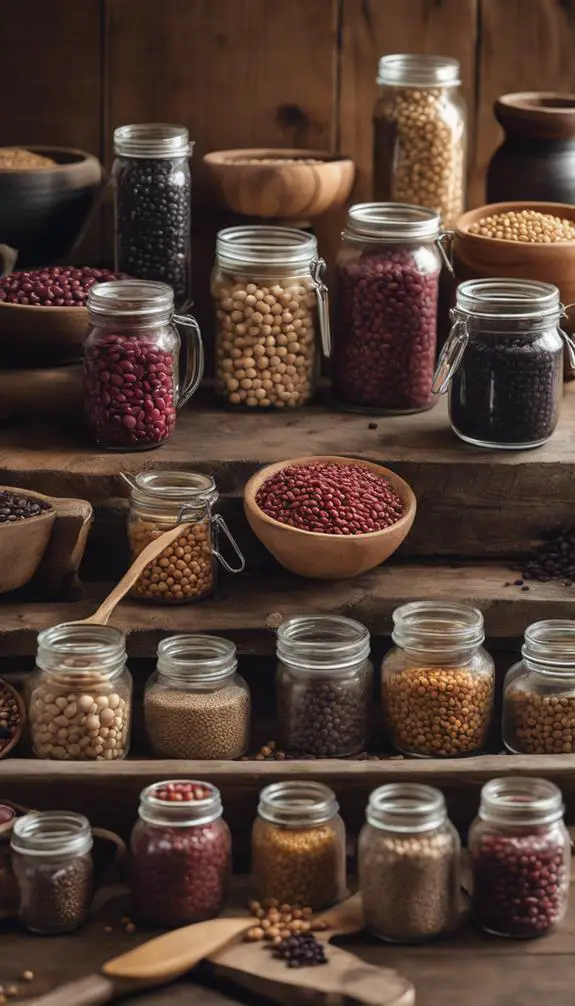
You may already be familiar with the versatility of dried legumes, but their nutritional benefits can't be overstated.
As a prepper, stocking up on legumes is a smart move because they're packed with protein, fiber, and essential vitamins and minerals. Legume benefits include lowering cholesterol, improving blood sugar control, and supporting healthy digestion.
You can incorporate legumes into your meals with simple Legume recipes like lentil soup, chickpea salad, or black bean tacos.
Store dried legumes like kidney beans, pinto beans, and black beans in airtight containers to preserve their nutritional value.
With a little creativity, you can enjoy the numerous benefits of legumes while maintaining your independence and self-sufficiency.
Baking Essentials for Comfort

You'll want to stock up on essential baking supplies to guarantee you can whip up comforting treats when you need them most.
Flour and sugar staples are must-haves, as they're versatile and can be used in a variety of baked goods, from bread to cookies to cakes.
Essential Baking Supplies
Baking essentials bring comfort and warmth to your prepper pantry, providing a sense of normalcy in uncertain times.
As you stockpile baking basics, you'll be prepared to whip up sweet treats that bring joy to your family. You'll need baking powder, baking soda, and salt to guarantee your baked goods turn out light and fluffy.
Don't forget spices like cinnamon, nutmeg, and vanilla extract to add flavor and aroma. Other essentials include cocoa powder, brown sugar, and honey for added sweetness.
With these staples, you'll be able to create a variety of treats, from comforting cookies to decadent cakes. By storing these baking essentials, you'll be ready to bring a sense of comfort and normalcy to your family in times of need.
Flour and Sugar Staples
Stocking up on flour and sugar staples is key to keeping your prepper pantry well-equipped for comfort baking.
You'll want to store a variety of flour types, including all-purpose, bread, cake, and pastry flour, to accommodate different recipes.
Consider adding alternative flours like almond, coconut, or oat flour for added versatility.
When it comes to sugar, stock up on white granulated sugar, brown sugar, and powdered sugar.
Don't forget sugar substitutes like honey, maple syrup, and stevia for added flexibility.
Having these staples on hand will guarantee you're prepared to whip up comforting treats whenever you need them.
Beverages for Hydration
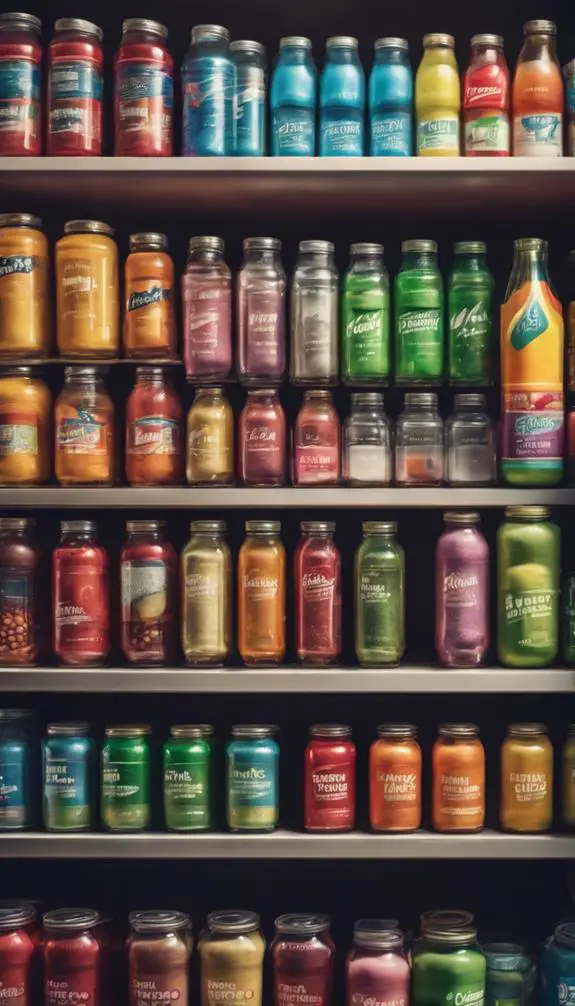
Having a reliable supply of beverages for hydration is crucial in a prepper pantry, as access to clean drinking water may be limited during an emergency.
You'll want to stock up on emergency drinks that provide essential hydration. Consider adding electrolyte-rich beverages like coconut water or sports drinks to your pantry. These can help replenish lost electrolytes and prevent dehydration.
Another hydration strategy is to store instant coffee or tea, which can provide a comforting and energizing beverage during stressful times.
Don't forget to include a water purification system or water purification tablets in your pantry to safeguard access to clean drinking water. With these beverages and hydration strategies in place, you'll be well-prepared to stay hydrated during an emergency.
Snacks for Quick Energy
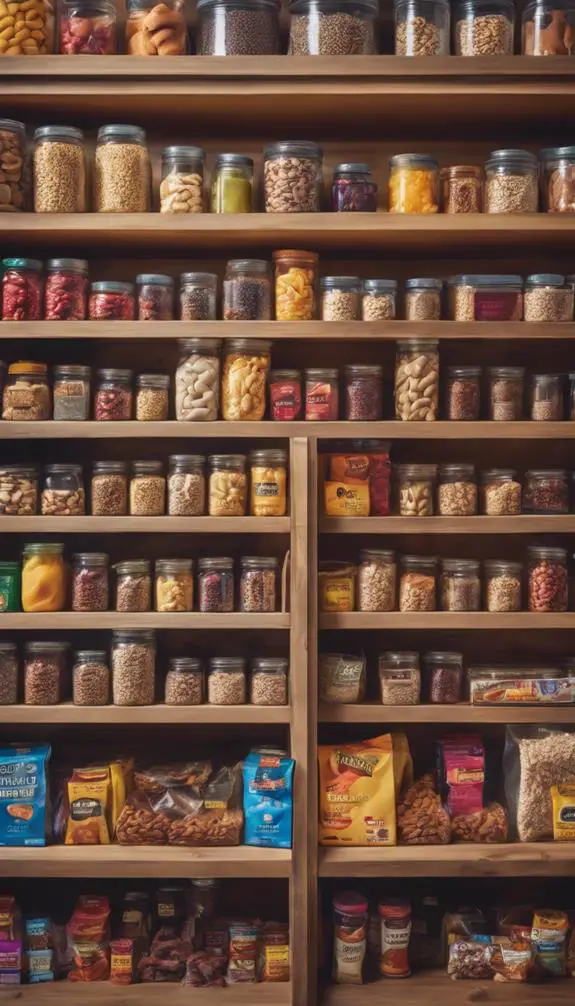
When you're facing an emergency situation, you'll need snacks that provide a quick energy boost to keep you going.
Energy Bites are a great option – they're easy to make, lightweight, and packed with nutrients. You can customize them with your favorite ingredients like nuts, seeds, and dried fruits.
Trail Mix is another excellent choice, offering a mix of carbohydrates, protein, and healthy fats to keep your energy levels up. Look for a mix that's low in added sugars and artificial ingredients.
Consider adding other snacks like jerky, canned fruit, and granola bars to your pantry. These snacks are compact, shelf-stable, and can be easily stashed in your bug-out bag or emergency kit.
Spices and Herbs for Flavor
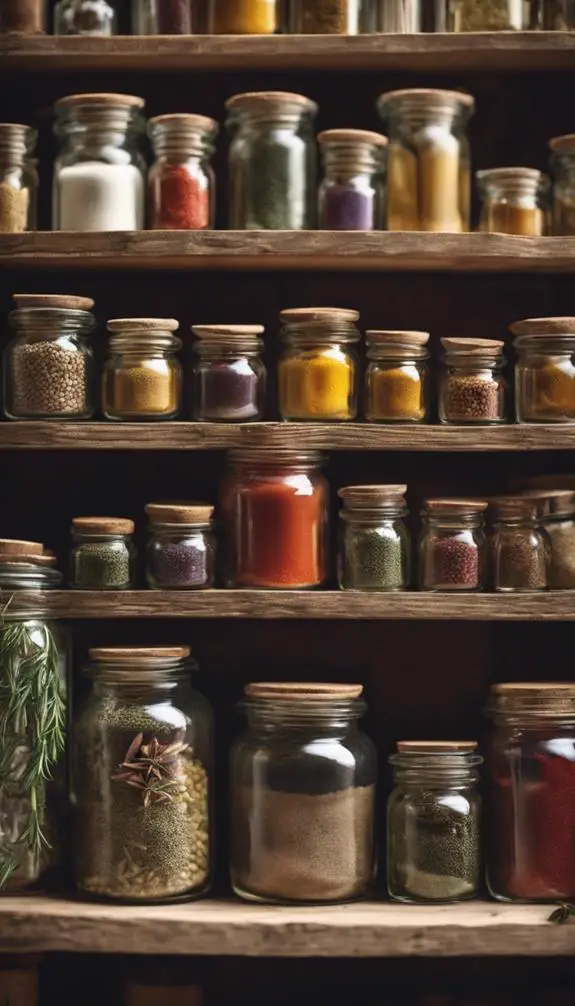
Your pantry should include a variety of spices and herbs to add flavor to your meals in an emergency situation.
These essentials will help you create fresh flavors and herby blends that'll make your meals more enjoyable.
Stock up on staples like salt, pepper, and sugar, as well as spices like cumin, paprika, and chili powder.
Don't forget herbs like basil, oregano, and thyme, which can be used to create flavorful soups and stews.
Consider adding garlic and onion powder for added depth of flavor.
With these spices and herbs, you'll be able to create a variety of dishes that'll keep your taste buds satisfied, even in a crisis.
Cooking Essentials and Oils
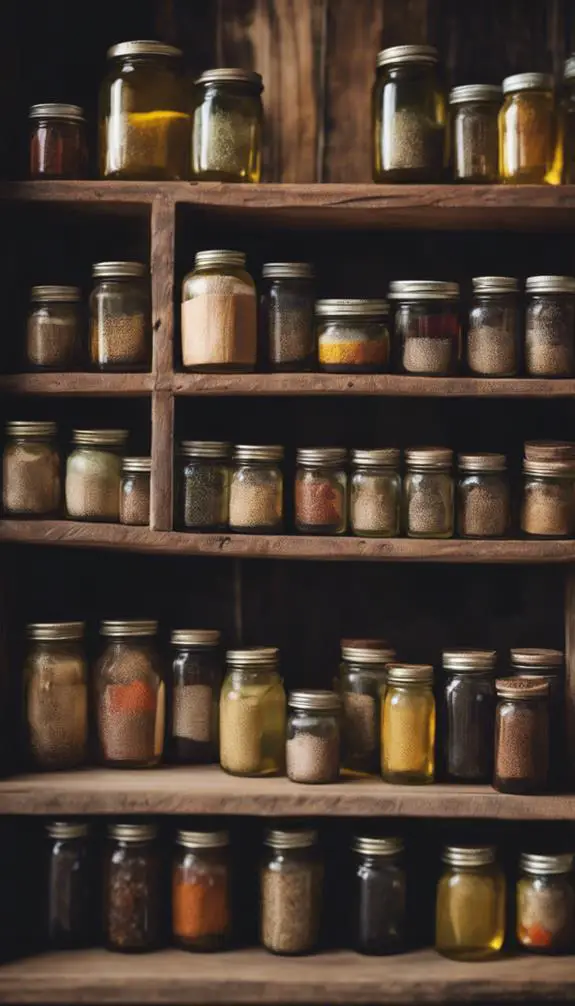
Now that you've stocked up on spices and herbs to add flavor to your emergency meals, it's time to think about the cooking essentials that'll help you prepare those meals.
Your prepper pantry should include cooking staples like flour, sugar, baking powder, and baking soda.
Don't forget flavor enhancers like soy sauce, hot sauce, and vinegar to add depth to your dishes.
Oils are also vital for cooking and preparing meals, so stock up on olive oil, coconut oil, and vegetable oil.
Consider adding specialty oils like sesame oil and avocado oil for added versatility.
These essentials will help you whip up a variety of meals, from bread to stir-fries, and guarantee you're well-equipped to cook in an emergency situation.
Personal Care Pantry Items

Stocking your prepper pantry with personal care essentials guarantees you're prepared to maintain hygiene and health during an emergency.
You'll want to store personal hygiene essentials like toilet paper, hand sanitizer, and biodegradable soap.
Don't forget feminine care products, such as sanitary napkins, tampons, and menstrual cups.
Including these items in your pantry certifies you'll have what you need to maintain personal health and hygiene, even when supply chains are disrupted.
Consider storing a supply of dental care items, like toothbrushes, toothpaste, and floss, as well as any personal medications or equipment you may need.
Pet Food and Supplies Storage

Emergency situations can be stressful enough without adding hungry, anxious pets to the mix.
You need a plan to keep your furry friends fed and healthy during a crisis. Store pet food in airtight, waterproof containers to maintain freshness and prevent spoilage.
Consider a 3-6 month supply of your pet's regular food, as well as a backup option in case their usual food is unavailable. Don't forget to stock up on treats, supplements, and medications.
Good pet storage tips include keeping food and supplies in a cool, dry place, off the floor, and away from direct sunlight.
Animal nutrition is vital, so research alternative food sources, such as canned goods or homemade recipes, in case commercial food becomes scarce.
FAQs
How Often Should I Rotate My Emergency Food Stock?
You should rotate your emergency food stock every 6-12 months to avoid food fatigue and guarantee freshness. Conduct a seasonal inventory to swap out expired or near-expired items, and consider a 'first in, first out' approach to maintain a reliable supply.
Can I Store Food in a Garage or Basement?
You're considering storing food in a garage or basement, but beware: temperature control and moisture levels can affect food quality. Guarantee a stable environment with temperatures between 50-70°F and humidity below 60% to preserve your stock.
Are Expired Canned Goods Still Safe to Eat?
You're wondering if expired canned goods are still safe to eat. Generally, they are, but it's vital to check for visible signs of spoilage and guarantee the cans are stored properly to minimize Botulism risk, as canned shelf life can vary greatly.
How Do I Keep Pests Out of My Food Storage?
You'll want to store food in airtight containers and employ rodent-proofing strategies, like sealing cracks and crevices, to keep pests out of your stash, ensuring your hard-earned supplies remain safe and secure from unwanted critters.
Can I Customize My Prepper Pantry for Dietary Restrictions?
You can tailor your emergency food stash to accommodate dietary needs by incorporating gluten-free, vegan, or keto options, ensuring you're prepared for any crisis while catering to your special diets and nutritional requirements.
Conclusion
You've stocked your prepper pantry with essentials to sustain you and your pets during an emergency. From canned goods to personal care items, you've got the basics covered. Don't forget to rotate your stock, check expiration dates, and update your supplies as needed. With a well-stocked pantry, you'll be better equipped to face unexpected challenges and keep your household safe and healthy until the crisis passes.

